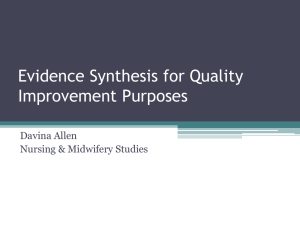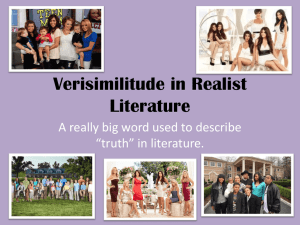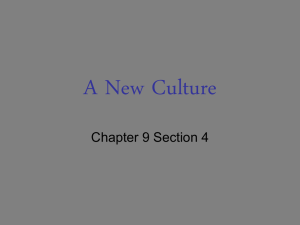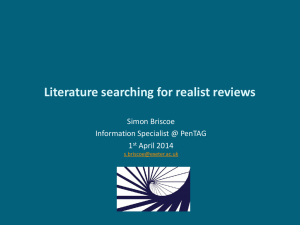Our regime of consumption is the underlying driver of global conflict
advertisement
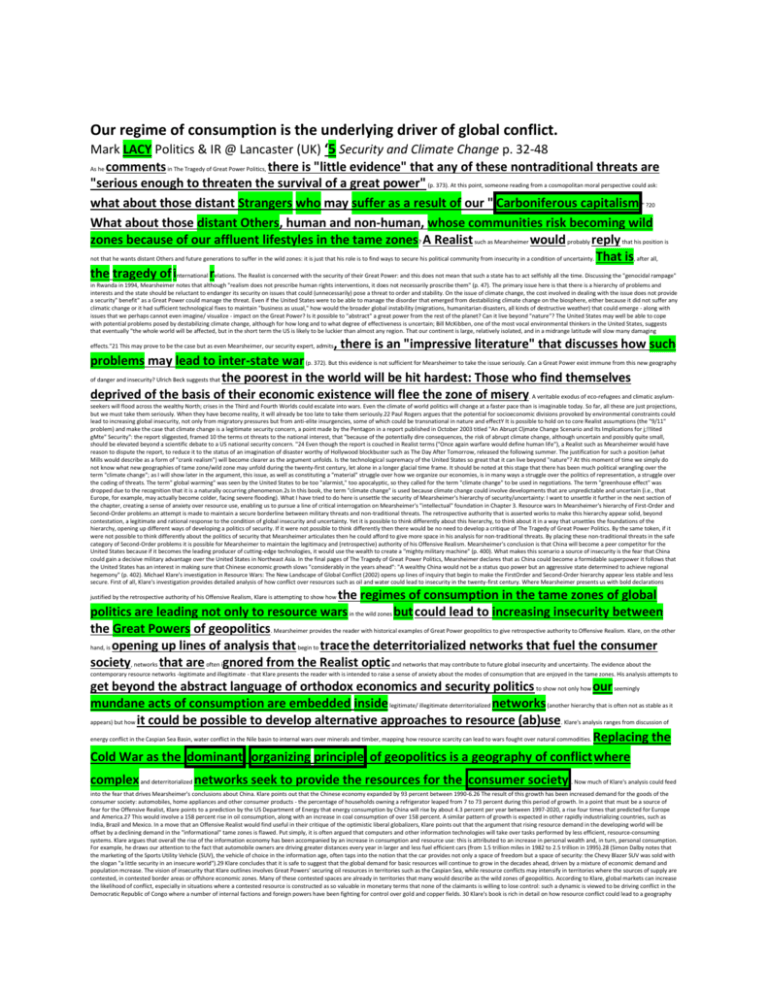
Our regime of consumption is the underlying driver of global conflict. Mark LACY Politics & IR @ Lancaster (UK) ‘5 Security and Climate Change p. 32-48 As he comments in The Tragedy of Great Power Politics, there is "little evidence" that any of these nontraditional threats are "serious enough to threaten the survival of a great power" (p. 373). At this point, someone reading from a cosmopolitan moral perspective could ask: what about those distant Strangers who may suffer as a result of our " Carboniferous capitalism " ?20 What about those distant Others, human and non-human, whose communities risk becoming wild zones because of our affluent lifestyles in the tame zones? A Realist such as Mearsheimer would probably reply that his position is not that he wants distant Others and future generations to suffer in the wild zones: it is just that his role is to find ways to secure his political community from insecurity in a condition of uncertainty. That is, after all, the tragedy of international relations. The Realist is concerned with the security of their Great Power: and this does not mean that such a state has to act selfishly all the time. Discussing the "genocidal rampage" in Rwanda in 1994, Mearsheimer notes that although "realism does not prescribe human rights interventions, it does not necessarily proscribe them" (p. 47). The primary issue here is that there is a hierarchy of problems and interests and the state should be reluctant to endanger its security on issues that could (unnecessarily) pose a threat to order and stability. On the issue of climate change, the cost involved in dealing with the issue does not provide a security" benefit" as a Great Power could manage the threat. Even if the United States were to be able to manage the disorder that emerged from destabilizing climate change on the biosphere, either because it did not suffer any climatic change or it had sufficient technological fixes to maintain "business as usual," how would the broader global instability (migrations, humanitarian disasters, all kinds of destructive weather) that could emerge - along with issues that we perhaps cannot even imagine/ visualize - impact on the Great Power? Is it possible to "abstract" a great power from the rest of the planet? Can it live beyond "nature"? The United States may well be able to cope with potential problems posed by destabilizing climate change, although for how long and to what degree of effectiveness is uncertain; Bill McKibben, one of the most vocal environmental thinkers in the United States, suggests that eventually "the whole world will be affected, but in the short term the US is likely to be luckier than almost any region. That our continent is large, relatively isolated, and in a midrange latitude will slow many damaging , there is an "impressive literature" that discusses how such problems may lead to inter-state war (p. 372). But this evidence is not sufficient for Mearsheimer to take the issue seriously. Can a Great Power exist immune from this new geography of danger and insecurity? Ulrich Beck suggests that the poorest in the world will be hit hardest: Those who find themselves deprived of the basis of their economic existence will flee the zone of misery. A veritable exodus of eco-refugees and climatic asylumeffects."21 This may prove to be the case but as even Mearsheimer, our security expert, admits seekers will flood across the wealthy North; crises in the Third and Fourth Worlds could escalate into wars. Even the climate of world politics will change at a faster pace than is imaginable today. So far, all these are just projections, but we must take them seriously. When they have become reality, it will already be too late to take them seriously.22 Paul Rogers argues that the potential for socioeconomic divisions provoked by environmental constraints could lead to increasing global insecurity, not only from migratory pressures but from anti-elite insurgencies, some of which could be transnational in nature and effectY It is possible to hold on to core Realist assumptions (the "9/11" problem) and make the case that climate change is a legitimate security concern, a point made by the Pentagon in a report published in October 2003 titled "An Abrupt Cljmate Change Scenario and Its Implications for j;!!lited gMte" Security": the report sliggested, framed 10 the terms ot threats to the national interest, that "because of the potentially dire consequences, the risk of abrupt climate change, although uncertain and possibly quite small, should be elevated beyond a scientific debate to a US national security concern. "24 Even though the report is couched in Realist terms ("Once again warfare would define human life"), a Realist such as Mearsheimer would have reason to dispute the report, to reduce it to the status of an imagination of disaster worthy of Hollywood blockbuster such as The Day After Tomorrow, released the following summer. The justification for such a position (what Mills would describe as a form of "crank realism") will become clearer as the argument unfolds. Is the technological supremacy of the United States so great that it can live beyond "nature"? At this moment of time we simply do not know what new geographies of tame zone/wild zone may unfold during the twenty-first century, let alone in a longer glacial time frame. It should be noted at this stage that there has been much political wrangling over the term "climate change"; as I will show later in the argument, this issue, as well as constituting a "material" struggle over how we organize our economies, is in many ways a struggle over the politics of representation, a struggle over the coding of threats. The term" global warming" was seen by the United States to be too "alarmist," too apocalyptic, so they called for the term "climate change" to be used in negotiations. The term "greenhouse effect" was dropped due to the recognition that it is a naturally occurring phenomenon.2s In this book, the term "climate change" is used because climate change could involve developments that are unpredictable and uncertain (i.e., that Europe, for example, may actually become colder, facing severe flooding). What I have tried to do here is unsettle the security of Mearsheimer's hierarchy of security/uncertainty: I want to unsettle it further in the next section of the chapter, creating a sense of anxiety over resource use, enabling us to pursue a line of critical interrogation on Mearsheimer's "intellectual" foundation in Chapter 3. Resource wars In Mearsheimer's hierarchy of First-Order and Second-Order problems an attempt is made to maintain a secure borderline between military threats and non-traditional threats. The retrospective authority that is asserted works to make this hierarchy appear solid, beyond contestation, a legitimate and rational response to the condition of global insecurity and uncertainty. Yet it is possible to think differently about this hierarchy, to think about it in a way that unsettles the foundations of the hierarchy, opening up different ways of developing a politics of security. If it were not possible to think differently then there would be no need to develop a critique of The Tragedy of Great Power Politics. By the same token, if it were not possible to think differently about the politics of security that Mearsheimer articulates then he could afford to give more space in his analysis for non-traditional threats. By placing these non-traditional threats in the safe category of Second-Order problems it is possible for Mearsheimer to maintain the legitimacy and (retrospective) authority of his Offensive Realism. Mearsheimer's conclusion is that China will become a peer competitor for the United States because if it becomes the leading producer of cutting-edge technologies, it would use the wealth to create a "mighty military machine" (p. 400). What makes this scenario a source of insecurity is the fear that China could gain a decisive military advantage over the United States in Northeast Asia. In the final pages of The Tragedy of Great Power Politics, Mearsheimer declares that as China could become a formidable superpower it follows that the United States has an interest in making sure that Chinese economic growth slows "considerably in the years ahead": "A wealthy China would not be a status quo power but an aggressive state determined to achieve regional hegemony" (p. 402). Michael Klare's investigation in Resource Wars: The New Landscape of Global Conflict (2002) opens up lines of inquiry that begin to make the FirstOrder and Second-Order hierarchy appear less stable and less secure. First of all, Klare's investigation provides detailed analysis of how conflict over resources such as oil and water could lead to insecurity in the twenty-first century. Where Mearsheimer presents us with bold declarations the regimes of consumption in the tame zones of global politics are leading not only to resource wars in the wild zones but could lead to increasing insecurity between the Great Powers of geopolitics. Mearsheimer provides the reader with historical examples of Great Power geopolitics to give retrospective authority to Offensive Realism. Klare, on the other hand, is opening up lines of analysis that begin to trace the deterritorialized networks that fuel the consumer society, networks that are often ignored from the Realist optic and networks that may contribute to future global insecurity and uncertainty. The evidence about the justified by the retrospective authority of his Offensive Realism, Klare is attempting to show how contemporary resource networks -legitimate and illegitimate - that Klare presents the reader with is intended to raise a sense of anxiety about the modes of consumption that are enjoyed in the tame zones. His analysis attempts to get beyond the abstract language of orthodox economics and security politics to show not only how our seemingly mundane acts of consumption are embedded inside legitimate/ illegitimate deterritorialized networks (another hierarchy that is often not as stable as it appears) but how it could be possible to develop alternative approaches to resource (ab)use . Klare's analysis ranges from discussion of energy conflict in the Caspian Sea Basin, water conflict in the Nile basin to internal wars over minerals and timber, mapping how resource scarcity can lead to wars fought over natural commodities. Replacing the Cold War as the dominant organizing principle of geopolitics is a geography of conflict where complex and deterritorialized networks seek to provide the resources for the consumer society . Now much of Klare's analysis could feed into the fear that drives Mearsheimer's conclusions about China. Klare points out that the Chinese economy expanded by 93 percent between 1990-6.26 The result of this growth has been increased demand for the goods of the consumer society: automobiles, home appliances and other consumer products - the percentage of households owning a refrigerator leaped from 7 to 73 percent during this period of growth. In a point that must be a source of fear for the Offensive Realist, Klare points to a prediction by the US Department of Energy that energy consumption by China will rise by about 4.3 percent per year between 1997-2020, a rise four times that predicted for Europe and America.27 This would involve a 158 percent rise in oil consumption, along with an increase in coal consumption of over 158 percent. A similar pattern of growth is expected in other rapidly industrializing countries, such as India, Brazil and Mexico. In a move that an Offensive Realist would find useful in their critique of the optimistic liberal globalizers, Klare points out that the argument that rising resource demand in the developing world will be offset by a declining demand in the "informational" tame zones is flawed. Put simply, it is often argued that computers and other information technologies will take over tasks performed by less efficient, resource-consuming systems. Klare argues that overall the rise of the information economy has been accompanied by an increase in consumption and resource use: this is attributed to an increase in personal wealth and, in turn, personal consumption. For example, he draws our attention to the fact that automobile owners are driving greater distances every year in larger and less fuel efficient cars (from 1.5 trillion miles in 1982 to 2.5 trillion in 1995).28 (Simon Dalby notes that the marketing of the Sports Utility Vehicle (SUV), the vehicle of choice in the information age, often taps into the notion that the car provides not only a space of freedom but a space of security: the Chevy Blazer SUV was sold with the slogan "a little security in an insecure world").29 Klare concludes that it is safe to suggest that the global demand for basic resources will continue to grow in the decades ahead, driven by a mixture of economic demand and population mcrease. The vision of insecurity that Klare outlines involves Great Powers' securing oil resources in territories such as the Caspian Sea, while resource conflicts may intensify in territories where the sources of supply are contested, in contested border areas or offshore economic zones. Many of these contested spaces are already in territories that many would describe as the wild zones of geopolitics. According to Klare, global markets can increase the likelihood of conflict, especially in situations where a contested resource is constructed as so valuable in monetary terms that none of the claimants is willing to lose control: such a dynamic is viewed to be driving conflict in the Democratic Republic of Congo where a number of internal factions and foreign powers have been fighting for control over gold and copper fields. 30 Klare's book is rich in detail on how resource conflict could lead to a geography of insecurity in the twenty-first century; a geography of insecurity that results from consumer desires circulating in the tame zones. Ii: would be interesting to know what the Realists of International Relations would make of an tame zones may need to rethink regimes of consumption inside the state: one of the uses of the hierarchy of First-Order and SecondOrder problems is to place a line of separation between risks that we can seek to manage with the technology of the militaryscientific complex (more efficient network war, Star Wars defense) from risks that may involve transforming existence inside the analysis that, although richly supported by "evidence," leads to the conclusion that the space of secure and affluent tame zones : the implications of this issue for Realist security politics will be discussed later in the book. Nevertheless, it is safe to conclude that the Realist may welcome research that shows in great detail that the liberal vision of informational economies transforming international relations is highly problematic. The Offensive Realist will feel a sense of intellectual security in their perspective when they find that China's onshore fields will not be able "to yield significantly increased supplies of petroleum, and that reluctant to become heavily dependent on foreign sources of energy, Beijing has begun to emphasize the development of offshore sources. "31 This project involves exploring promising fields in deeper waters, such as areas off shore of Vietnam, where it has also expanded its military presence. In short, tension could emerge in the South China Sea over access to oil supplies; Klare points out that there is also potential for conflict between China and Japan on the East China SeaY It appears inevitable that the rise of a Great Power will involve offensive actions that will result in the formation of a formidable peer competitor: while the analysis may not have had the depth and detail of Klare's investigation, the retrospective authority of the Offensive Realist perspective appears to have isolated the First-Order problem of the twentyfirst century. It is useful to note here that Klare, like Mearsheimer, contributed in 2002 and 2003 to the discussion over the significance of a regime change in Iraq through articles such as "It's the Oil, Stupid!" and "Resist War and Empire" (both published in The Nation) and "Options Exist Short of War" in USA Today.33 Klare shared Mearsheimer's view that the war was an unnecessary risk and that Iraq needed to be contained through surveillance. Klare sees the war as an outcome of "the Cheney Report," a report officially known as the National Energy Report published by the White House in May 2001. The document revealed that imported supplies of oil accounted for half of the oil consumption in the United States in 2000 but will rise to two-thirds in 2020. Klare comments that despite all the discussion of oil drilling in Alaska, an issue that has irritated many environmentalists, Iraq was viewed as a priority in order to secure access in the Persian Gulf.34 Klare also comments that Saddam Hussein had begun to parcel out concessions to the most promising fields to oil firms in Europe, Russia and China. According to a report by the International Energy Agency, Hussein had awarded these contracts for fields with an estimated potential of 44 billion barrels of oil, an amount that is equal to the total reserves of the United States, Canada and Norway. Klare suggests that at current rates of $25 per barrel, the fields could be worth around $1.1 trillion. Now I would not want to reduce the war in Iraq to the desires of the oil power elite in the United States: a case could be made that the war was also about creating a spectacle of power, a spectacle of deterrence in a moment of insecurity and humiliation. Nevertheless, the "worst-case scenario" that emerges from Klare's investigation in Resource Wars points to similar conflicts emerging in the future, along with conflicts and insecurity in the wild zones. The Offensive Realist perspective would place Klare's view as non- the role of the Realist is to devise means to defend ways of life inside the space of sovereign territory, to protect territory so that we do not have to transform our mode of existence, to create a secure existence inside a shield enabled by the military-scientific complex. The Realist will find offensive the manner in which Klare draws out the links between consumption, resource conflict and climate change , blurring the line of separation between First-Order and Second-Order problems. From the outset, Klare's Realist - and, therefore, illegitimate - analysis due to the fact that he advocates the transformation of our consumer culture in affluent tame zones. As it has already been noted, analysis is sensitive to the impact increased resource use could have on human-generated climate change and, in turn, the impact that climate change could have on the politics of (in)security (such as increasing competition over access to vital materials, increase in humanitarian disasters, accelerating loss of biodiversity, and so on). China accounts for 13 percent of world carbon emissions, compared to 24 percent for the United States; China's share of emissions is expected to rise to 21 percent by 2020, while the United State's share will drop to 20 percent. As Klare points out, implementing a regime that emerges from the United Nations Framework on Climate Change will become increasingly difficult. Sensitive to the uncertainty of human-generated climate change, Klare is reluctant to suggest how the geography of security could be affected. However, he suggests that areas like northeast Africa (through which the Nile passes) and South West Africa (through which the Tigris and Euphrates flow) will be left with smaller supplies of water. At the same time, he points out that water shortages in these regions does not make war inevitable as there are opportunities to resolve disputes over water through negotiation. But Klare points out that some of the most acute disputes over water have arisen in regions where intergovernmental relations are "fractious. "35 But what the Offensive Realist would find most offensive is that not only is Klare blurring the distinction between First-Order and Second-Order problems, suggesting that the connections between Great Power blurring of these categories leads him to conclude that a First-Order problem is to find alternative ways to manage resources, an alternative political economy of security. An important component in Klare's proposal for an alternative future is for an "accelerated, global program of research on alternative energy sources and industrial processes. "36 In terms of energy supplies, Klare argues that a global authority could be formed to coordinate the search for competition, resource conflict and non-traditional dangers are potentially more connected than the hierarchy allows, Klare's alternative fuels and to allocate existing supplies in the event of a crisis. Klare points out that the foundations for such an institution already exists with the International Energy Agency (lEA). 37 The IEA was established in response to the 1974 Arab oil embargo and was intended to orchestrate the sharing of oil by the Western countries in times of emergency. For the Realist such a project is not only idealistic, it is potentially against the "interests" of great is an accelerated global project for devising new energy sources less "realistic" than attempting to slow the economic growth of China? Klare's approach to the politics of security - an approach that attempts to draw out the connections between supposedly random geopolitical events and resource (ab)use - is sensitive to the issue powers. Yet that the problem of economic growth by states such as China is not simply that it could lead to conflict as states (and other deterritorialized networks) struggle over access to oil and other resources but that growth based on the securing access to the resources that enable consumer lifestyles in a fossil fuel economy has - and will continue to be - an important dimension of Great Power politics. It is credible to assert that one of the reasons for the Gulf War in 2003 was to secure access to oil. Contemporary Great Power interest in Africa may well be connected to anxieties over oil and resource access. It seems fair to assert that securing consumer existence in carboniferous capitalism is central to the politics of security. Not only is there evidence that the fossil fuel economy may lead to insecurity on a local level, as the case of the environmental destruction of Ogoniland in Nigeria made clear, it seems clear that considerable energy and resources are placed into securing existence in the tame zones. The Realist could reply that local security problems that emerge from the oil economy are of little consequence in the big geopolitical scheme of things. But while the Realist current definition of development could have damaging future impacts on the biosphere. At this point in the argument it is important to set out a number of claims. First, may be able to dismiss the argument that the inhabitants of the tame zones have a moral responsibility to distant Others, the long-term strategic claims are more serious. Considerable securitizing energy is invested into protecting existence in the tame zones. However, there is reason to believe that these modes of existence are creating future insecurity. The Realist perspective, secure with its retrospective authority, is unwilling to think differently, even though it is a perspective that purports to take "worst-case" scenarios seriously. The Offensive Realist may differ with politicians and policy makers on what are significant points of strategic detail (and a Realist enjoys being out of time), yet the hierarchy of First-Order and Second-Order problems that is the foundation of Offensive Realism is also the foundation of Great Power politics: the dangers may vary but they still conform to the retrospective authority of the traditional Realist imagination. Just as climate change is a Second-Order problem in the Offensive Realist perspective, so it is in the real world of power politics, even though, as the Pentagon report cited earlier makes clear, there are security experts acknowledging the threat of humangenerated climate change to the national interest. Just as the Offensive Realist has to take steps to construct climate change as an illegitimate threat, as a Second-Order problem, so politicians have worked to code climate change as an illegitimate danger, as a danger that we can safely ignore. For example, in 2003 a draft of a report by the Environmental Protection Agency (EPA) leaked to The New York Times raised suspicions that the White House had deleted details about global warming, inserting information from a report that questions climate science (and was partly financed by the American Petroleum Institute, an industry front group). A memo circulated among the EPA apparently suggested that the report "no longer accurately represents scientific consensus on climate change." The aim of the report was to provide a comprehensive overview of the big environmental issues.38 Another memo that was circulated by a leading Republican consultant conceded that the party has "lost the environmental communications battle" and urged politicians to encourage the view that there is no scientific consensus on the dangers of greenhouse gases: "The scientific debate is closing [against us] but not yet closed. There is still a window of opportunity to challenge the science." The strategy of suggesting that the science is simply too uncertain has often been used by networks opposed to an ecopolitical security agenda. However, the attempts to contain the threat of climate change as a FirstOrder problem, as the memo intimates, becomes increasingly difficult as alternative networks composed of environmental organizations and scientific research bodies provide information that makes the hierarchy of security appear unstable. The memo advises political figures to avoid "frightening" phrases such as "global warming." Global warming, it is suggested, should be abandoned in favor of climate change; the party should describe its policies as conservationist instead of environmentalist because most people think environmentalists are "extremists" who indulge in "some pretty bizarre behavior ... that turns off many voters." According to one source, the phrase "global warming" appeared frequently in Bush's speeches in 2001, but virtually disappeared during 2002, when the memo was produced.39 These tactics all mirror the attempts by the Offensive Realist perspective to code climate change (or global warming) as an illegitimate threat, as a threat that needs to be actively repressed if the hierarchies of security that govern our lives are to hold. The National Energy Policy, drawn up in the first 100 days of the administration, directed by Dick Cheney, relegates discussion of climate change to what Bill McKibben refers to as "six unremarkable paragraphs in the middle of the report." The report suggests that energy needs will rise by 32 percent by 2020 - and it chooses increased production of coal, gas and oil to meet these needs: this prevents a serious commitment to respond to climate change. If we build the 1,300 power plants that various cabinet members have called for, the long term consequences will be significant, as McKibben illustrates: "A new power plant is designed to last at least forty years. Build a coal-fired one in 2003 and it will still be there in 2043, paying back its capital investment and belching out carbon dioxide. " 40 Social change of the energy regime is a pre-requisite for stopping climate change. Leigh GLOVER Policy Fellow @ Center for Energy and Envt’l Policy Delaware University ‘6 Postmodern Climate Change p. 2-3 Framed in this rational manner, the problem itself suggests the solution. Initially, a goal for an acceptable level of future global warming (and therefore an acceptable level of climate change impacts) is established. Scientific knowledge is applied to understand the relationship between greenhouse emissions and climate change, science and policy are both used to set emission reduction targets, and institutions are formed to undertake the functions of governance. All nations are threatened by climate change and all contribute some level of emissions, so that governance mechanisms are required at the national and global scales. Climate change is seen as necessitating modification of routine industrial pol1ution through management by the dictates set by an emerging system of global environmental governance. Scholarship founded on the basis of this formulation of the problem can comfortably place climate change within the context of conventional political analysis , which is indeed what has occurred. Now is the time to chal1enge the conventional view of climate change. Climate change represents a problem more fundamental and intractable than pollution, which manifests a deeper and more elemental set of social organization, values, and philosophies. Fundamental1y and essential1y, climate change is a product of modernity and is being subject to the scientific knowledge systems, approaches to governance, and environmental management goals that comprise modernity's characteristic responses to environmental issues. To date, few have questioned the premises of modernity When analyzing the international response to climate change. Yet, there are vital and urgent reasons for posing such an inquiry. Climate change portends greater social change than the matters of turbulent international relations, interminable discussions of complex policy choices, and vexing scientific questions that dominate climate change's contemporary scholarship. Consider, for example, the following issues that challenge the existing response to climate change: • effectiveness of reducing future atmospheric greenhouse gas concentrations on future climate is unknown; • climate change impacts will produce great global redistributions of wealth and welfare that remain highly uncertain; • reducing global greenhouse gas emissions to achieve the so-called 'stable climate' requires a re-organization of the energy systems of developed nations that cannot Occur without great social change, the transition to which remains largely unknown; • efforts to organize an effective means to reduce global greenhouse gas emissions have conspicuously failed and emissions continue to increase national economic development has usually occurred through industrialization based on fossil fuel energy systems, yet any efforts to curtail global emissions will probably fail if developing nations continue to follow the historical high emissions path to economic development. Addressing climate change has proved not only to be difficult, but presents difficulties in ways and in places where the greatest confidence in the human capacities has been exhibited; not only is it not amenable to conventional national approaches to environmental problems, but poses challenges to existing systems of knowledge and environmental problem resolution. In this work we respond to this challenge by examining climate change not as a problem of managing complex social and natural systems, but as a problem of modernity itself. Oriented thus, more original issues emerge as we switch from the conventional fixation on remedy to the more radical issue of cause , considering climate change as a matter of the legitimacy of modern systems of knowledge, social organization, and environmental management. Only through understanding the social causes of climate change and recognizing the limits of the modernity can there be much hope for generating effective alternative responses in the future. Globally, the response of the international community of nations to climate change is organized under the auspices of the UN Framework Convention on Climate Change (FCCC). Studying the international response to climate change involves examining the processes, activities, and politics surrounding this institution. as it involves climate change science, the formulation of international policy initiatives, and the setting of management goals. Analysis of the international response concentrates on the period beginning with the international negotiations leading up to the 1992 UN Conference on Environment and Development, covering the formulation of the FCCC at that event, and extending to the ratification of the Kyoto Protocol in early 2005. Excessive consumption isn’t inevitable. Now is a crucial point for questioning materialist values and lifestyle. Tim JACKSON Sustainable Development @ Surrey (UK) ‘9 Prosperity without Growth p. 148 Alternative hedonism Change is essential. And some mandate for this change already exists. There is cross-party concern over the social recession. And alarm at evidence like the Sheffield study. Politicians struggle for solutions. Small-scale initiatives aimed at addressing the pernicious impacts of social recession are springing up at grass roots level, led by community groups or local authorities. II The philosopher Kate Soper points to a growing appetite for 'alternative hedonism', sources of satisfaction that lie outside the conventional market. She describes a widespread disenchantment with modern life - what she refers to as a 'structure of feeling' that consumer society has passed some kind of critical point, where materialism is now actively detracting from human wellbeing. 12 Anxious to escape the work and spend cycle, we are suffering from a 'fatigue with the clutter and waste of modern life' and yearn for certain forms of human interaction that have been eroded. We would welcome interventions to correct the balance, according to Soper.

